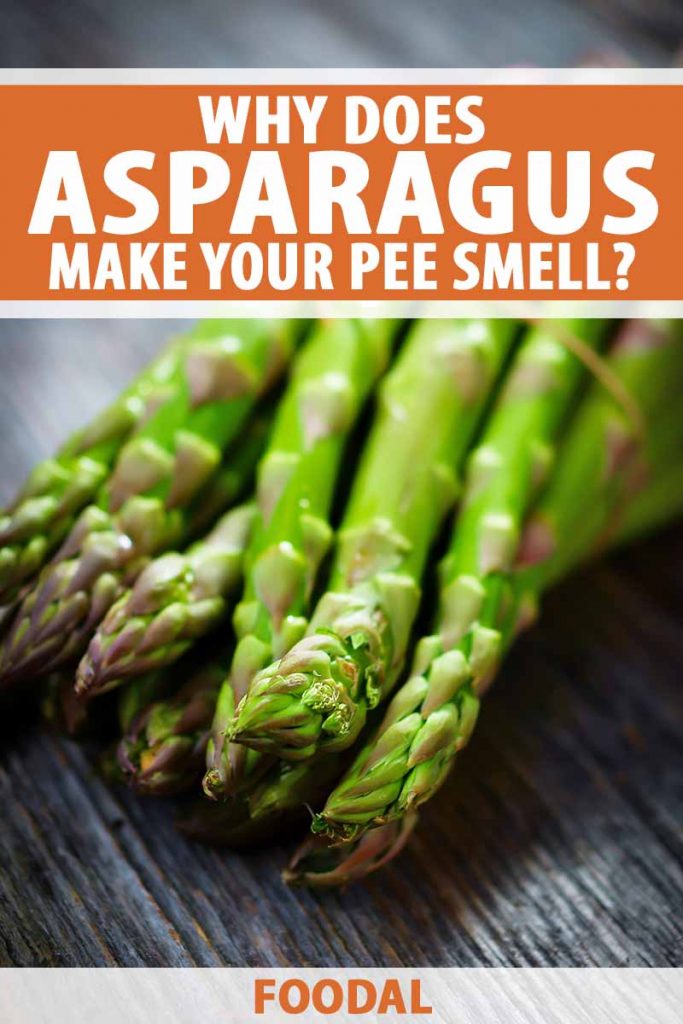We occasionally link to goods offered by vendors to help the reader find relevant products. Some of these may be affiliate based, meaning we earn small commissions (at no additional cost to you) if items are purchased. Here is more about what we do.
Teeheehee – asparagus pee!
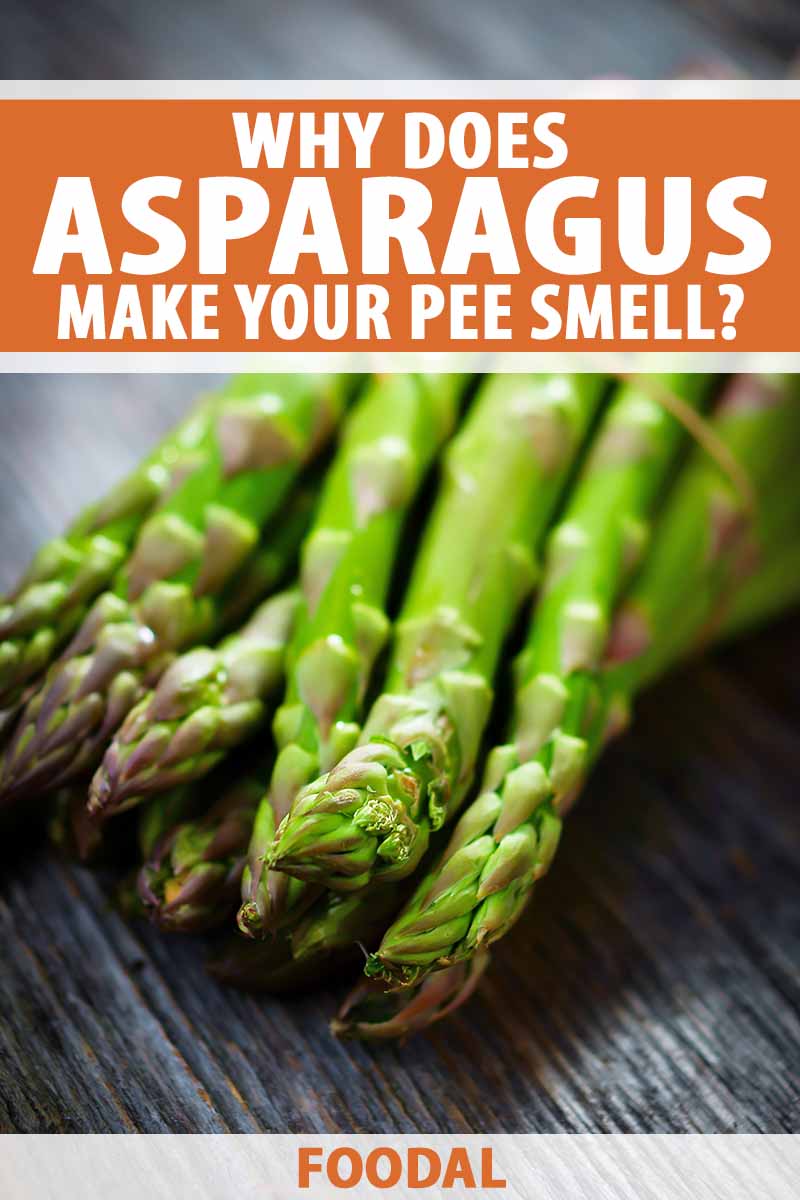
Oh, come on… it’s funny! And a little strange. And very stinky.
As someone who suffers from this odd – yet completely harmless – digestive phenomenon, I want to know more.
And after introducing this topic of conversation to friends and family, and collecting quite a few memorable stories and strong opinions along the way, so do many of you!
Someone told me they were invited to a wedding where the bride and groom refused to serve soup made with this particular vegetable, because they didn’t want any potential pee problems stinking up the venue’s restrooms.
And the first time my friend’s husband noticed the smell coming from his urine, he freaked out. Growing up, his family never ate asparagus, so it wasn’t until he was in his 30s – and on one of their first dates together – that he finally ate some and discovered the unexpected reaction!
But then another friend’s husband reported that he never noticed any smell at all after eating it!
So, what’s the deal?
What causes asparagus pee? Why does it have such a distinct smell? Is there a different digestive impact if you’re consuming the vegetable raw versus cooked?
Could genetics have anything to do with this? Is it possible to prevent the smell, by doing something other than eliminating this food item completely from your diet?
And so, it is my bizarre mission in this article to dive deep into the soup, as it were, to discover why asparagus makes our pee stinky, and explain all the dirty details to you.
Have an air freshener at the ready, and prepare yourself for a weird journey.
What Causes Asparagus Pee?
But First… What Is Asparagus Pee?
To put it plainly:
“Asparagus pee” refers to the oddly distinct smell of urine expelled after eating asparagus.
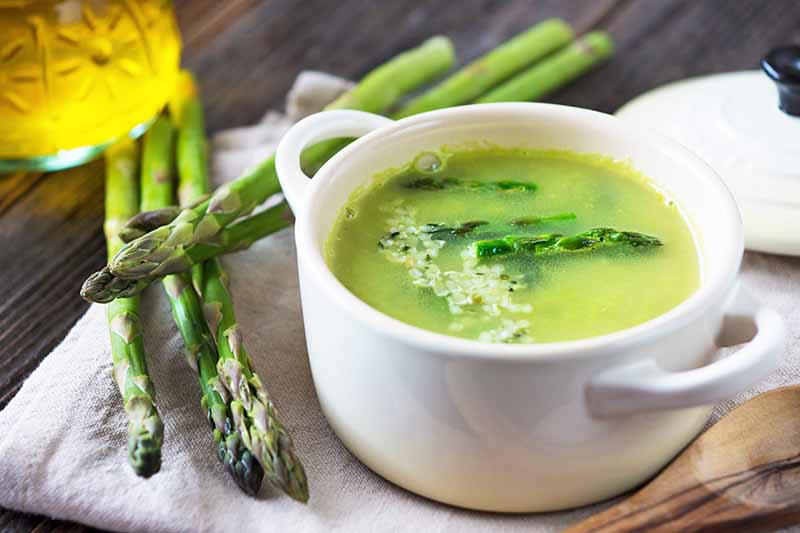
One of the reasons why this topic is so humorously controversial is that not everyone suffers from this bizarre urinary issue – or they at least claim they don’t – causing arguments amongst friends, family, and couples regarding its supposed existence.
Maybe you have this issue in your own household…
Perhaps your significant others vehemently deny their urine smells funny after enjoying a delightful dinner of roasted prime rib with a side of steamed stalks, or a fluffy frittata topped with a bunch of spears, claiming that there’s nothing wrong with their excretions.
Who knows – they could be saving face. Or maybe they don’t actually smell anything odd at all.
Maybe your pee… has always smelled like that?
But history and science are both on our side. What we do know is that this has been a topic of discussion for centuries.
Go tell your skeptical buddies.
In a letter directed to the Royal Academy of Brussels in 1781, Benjamin Franklin aimed to persuade the Academy to develop a drug that could be combined with certain foods to minimize foul odors emitted from the human body that are “usually offensive to the Company.”
Most notably discussing “the natural Discharges of Wind from our Bodies,” Franklin’s desire was to create a healthy remedy to render these human smells “not only inoffensive, but agreable as Perfumes.”
Farting. Benjamin Franklin was talking about farting.
As part of his argument, he also mentioned that “we have the Power of changing by slight Means of Smell of another discharge, that of our Water.”
Ah, but there it is: Peeing. Benjamin Franklin also discussed peeing in his missive.
In this letter, in fact, he specifically pointed out that “a few Stems of Asparagus eaten, shall give our Urine a disagreable Odour.”
While we’re still waiting on that miracle drug to make our belches, farts, and other excretions smell like a beautiful perfume – sorry to disappoint you, Ben – we can at least review the research behind why it makes our pee so putrid.
Asparagusic Acid – The Main Culprit?
We can point the finger directly at asparagusic acid as the leading precursor of the stink. Probably.
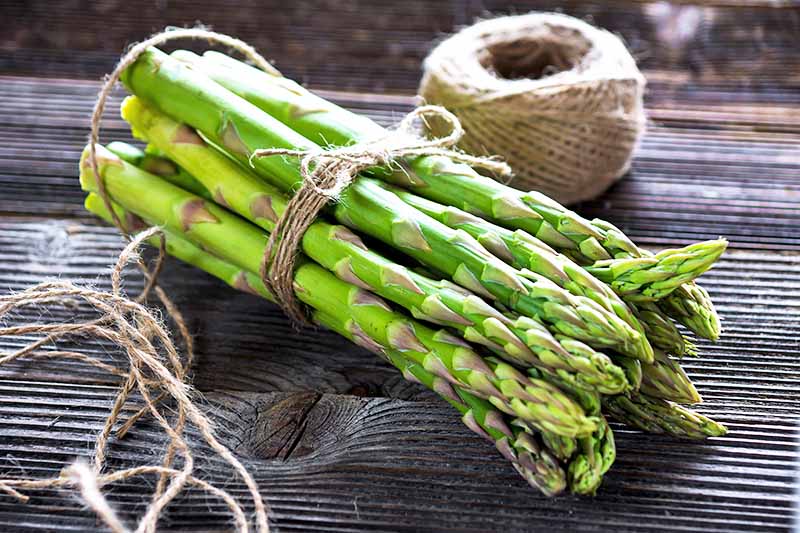
Asparagusic acid is an organosulfur molecule unique to asparagus that includes sulfuric compounds in its molecular formula. But the spears contain other sulfuric compounds as well.
Unlike cabbage, broccoli, and eggs – whose sulfuric compounds are often instantly noticeable upon cooking – the odorants of this edible stalk are not easily detected with a quick sniff of the raw vegetable, or upon cutting and cooking the stalks.
Regardless of the way in which you prepare or cook asparagus, these odor-generating compounds are released upon digestion.
When our bodies digest this vegetable, and the asparagusic acid and other sulfuric compounds are broken down, the most up-to-date research suggests this is likely responsible for generating strong, volatile odors that are identifiably pungent when excreted through urine, and quickly dispersed throughout the surrounding air.
While digestion is a complex process involving the breakdown of various components found in a single food item, the metabolic breakdown of asparagusic acid in particular is the most probable cause of this specific odor.
And this can be noticeable within minutes after consuming just a few stalks when you’re enjoying dinner, usually starting in as little as 15 minutes after ingestion, and lasting for hours.
There’s no clear consensus as to how long the smell lasts, with some disagreement between various studies. One 2018 study demonstrated it could last for about 9 hours, while another study from 2019 concluded the unpleasant aroma could persist for up to 14 hours.
No matter how long it actually takes to go away, it’s a stinky nuisance.
He Who Smelt It…
Ready for the most important thing to know when considering this odd phenomenon? Not everyone can detect the strange odor. And some lucky few might never realize it exists.
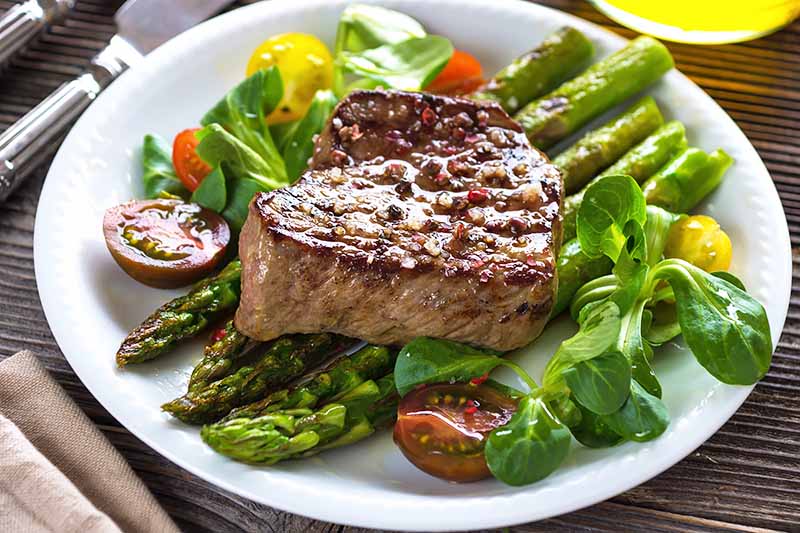
While scientists have yet to confirm the main compounds that cause the smell with 100% certainty, the research has revealed some fascinating and highly variable results regarding the ability to produce and/or detect this smell from one individual to the next.
There are two possible explanations for an individual’s inability to smell the scent of this particular pee: either some people don’t produce the odorants, or some people can’t smell the odorants.
Actual mileage may vary, and individual differences may lie anywhere along the spectrums of odorant production and perception.
An article published in the journal Metabolites in 2020 explained, based on an analysis of other published studies, that some people are able to produce the compounds but not smell them, while others cannot produce the compounds but can still perceive the smell. Still others can both produce and smell asparagus pee, while certain individuals neither produce nor possess the ability to smell it.
And one’s own personal peculiarities, opinions, and experiences also play a part in this.
You may be incredibly hypersensitive to “weird” smells, perhaps – dare I say it – overexaggerating and dramatizing your reaction to a scent that doesn’t exactly smell pleasant.
Or maybe you’ve grown accustomed to unusual scents on a daily basis, or you honestly weren’t paying much attention during a quick trip to the powder room during dinner, so a minor fluctuation in urinary aroma isn’t that big of a deal to you.
The perceived strength or weakness of the aroma could also be due to multiple digestive factors, such as the efficiency of an individual’s digestive system, or the unique variety of gut bacteria involved in the breakdown.
Some studies have linked certain genetic mutations with the ability or inability to smell the urine’s strong odor after consuming asparagus.
In a 2016 study in which 6,909 men and women were tested for asparagus pee anosmia, or an inability to detect the smell, 3 out of every 5 participants were not able to smell the odor.
The authors of this study explained that genetic variations in multiple olfactory receptors could be associated with an individual’s ability to detect, or fail to detect, the metabolites of asparagus in urine.
Without any clear black-or-white answers across the board regarding perception of this green veggie upon micturating, we are left to play a stinky game of Russian Roulette when serving this particular veggie to a group of highly variable individuals.
But we think it’s a game worth playing, don’t you?
Are Preventive Measures Available?
If you agonize over your odorous pee, but still enjoy munching on a perfectly crisp-tender stalk, I’m sorry to say there really is no miracle solution or magical pill to 100% eliminate the stench.
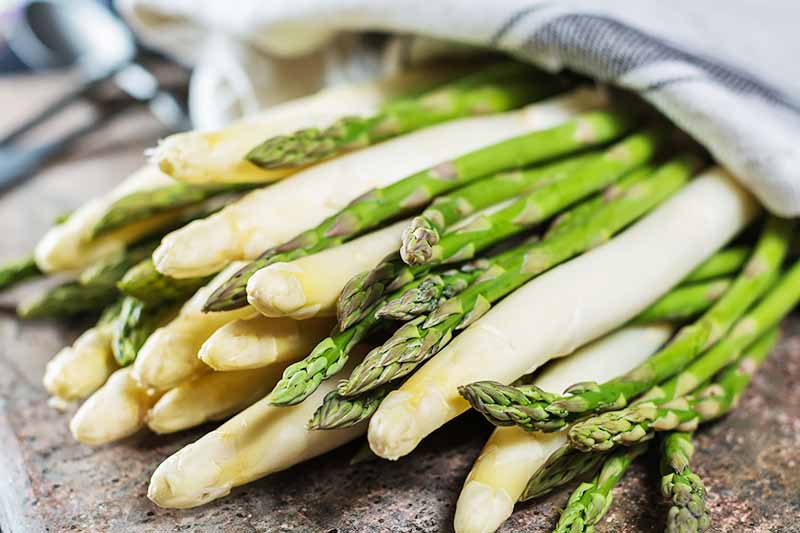
You’re stuck with it, but at least it’s only a temporary inconvenience.
However, there are some helpful tips and tricks that you could try the next time you’re eyeing up a recipe for perfectly roasted stalks when they’re fresh and in season.
Again, the bodily reactions to these suggestions may vary from person to person, but they are worth a try – no harm done, other than a slightly stinky bathroom if they fail!
Drinking plenty of liquids – water in particular – while you are eating the tasty stalks and for several hours after the meal will help you to excrete the aromatic compounds at a more rapid pace, potentially diluting them as well.
You can also experiment with a switch from green to white asparagus. The white variety has a more delicate aroma and fewer volatile sulfuric compounds compared to green, as stated by Harold McGee in his book “On Food and Cooking,” which is available on Amazon. This paler variety may result in an excretory odor that is weaker than what you’d get with the green variety.
Try this suggestion by making our recipe for baked tilapia and white asparagus, or use white instead of green in our fresh and fruity salad recipe for a beautiful contrast of colors!
Another solution would be to cut off the tips of each stalk when you’re preparing them for use in a recipe, since the majority of the odorous compounds are located there.
But many – including us at Foodal! – consider the tips to be a culinarily crucial part of the stalk to enjoy. Why waste a perfectly edible and tender portion to only potentially minimize the smell of your urine?
In the end, if you have accepted your fate when consuming asparagus the next time you are planning dinner, the best option is to stock your bathroom with candles or air fresheners.
A large scented candle is a beautiful option to diminish uglier smells.
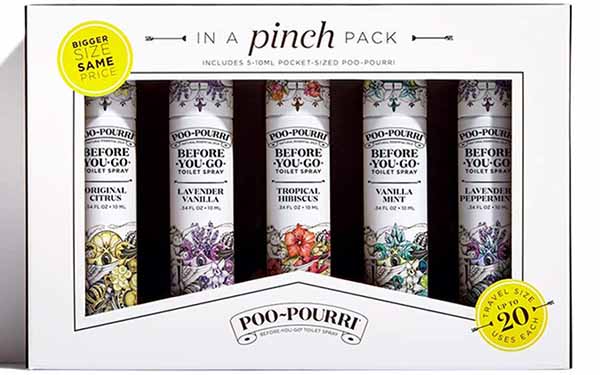
Poo-Pourri Before-You-Go Toilet Spray, 5-pack, available on Amazon
And if you’re traveling or going out to a restaurant, bring along a pocket-sized Poo-Pourri Before-You-Go Toilet Spray. These are available on Amazon in assorted packages of 10-milliliter bottles in five different scents – Original Citrus, Lavender Vanilla, Lavender Peppermint, Tropical Hibiscus, and Vanilla Mint.
We Still Love Asparagus
And we’ll never stop loving it!
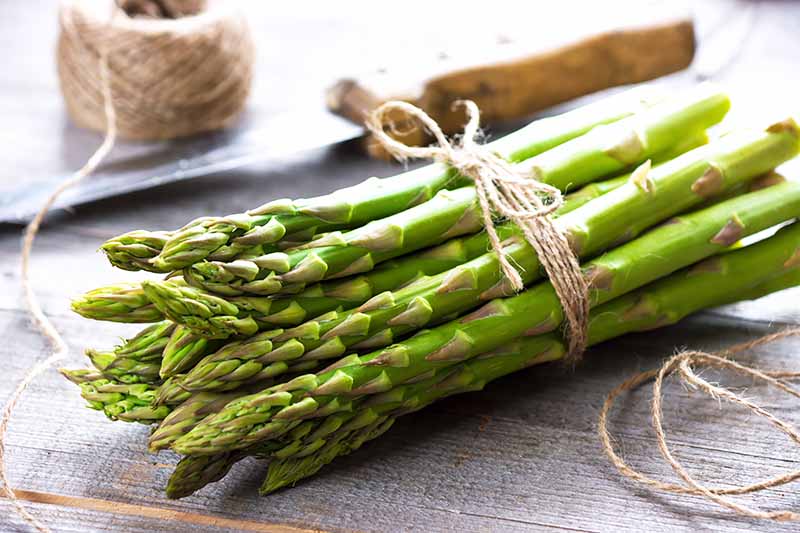
We’ll continue to buy bunches at the grocery stores and farmers markets! And we’ll continue growing and harvesting them from our gardens too – you can find tips for doing this on our sister site, Gardener’s Path.
So what if it means we need to keep our bathrooms well-stocked at all times with candles, matches, and air fresheners?
So what if you want to order a side of sauteed stalks on a first date? In addition to talking about your favorite hobbies, top movies, and astrological signs, why not talk about asparagus pee, too?
There’s no better way to break the ice and really get to know a person than to talk about some good ol’ fashioned bodily embarrassments. Might as well also talk about beeturia, too!
Whatever the outcome, stinky or not, the risk of encountering a passing stink cloud is a small price to pay to enjoy a delightfully tasty and healthy veggie!
With heads held high as we enter the bathroom, and our noses plugged when we exit, we’ll regret nothing when we prepare and consume this vibrant vegetable. And we have some favorite ways to do just that to share with you.
We dare you to make any of these asparagus recipes for your next dinner party, and see – or smell, rather – what madness ensues starting about 15 minutes after eating…
© Ask the Experts, LLC. ALL RIGHTS RESERVED. See our TOS for more details. Uncredited photos via Shutterstock. Product photos via Amazon and Sur La Table.
Nutritional information derived from a database of known generic and branded foods and ingredients and was not compiled by a registered dietitian or submitted for lab testing. It should be viewed as an approximation.
About Nikki Cervone
Nikki Cervone is an ACS Certified Cheese Professional and cheesemonger living in Pittsburgh. Nikki holds an AAS in baking/pastry from Westmoreland County Community College, a BA in Communications from Duquesne University, and an MLA in Gastronomy from Boston University. When she's not nibbling on her favorite cheeses or testing a batch of cupcakes, Nikki enjoys a healthy dose of yoga, wine, hiking, singing in the shower, and chocolate. Lots of chocolate.

